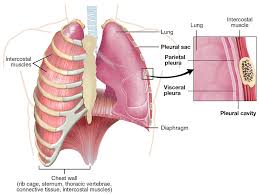Symptoms of Chest Wall Cancer
The symptoms of chest wall cancer can vary depending on the type and stage of the tumor but generally include:
- Pain: Persistent pain in the chest area that may worsen with movement or breathing.
- Swelling or Lump: Noticeable mass or swelling in the chest wall.
- Breathing Difficulties: Shortness of breath or difficulty breathing.
- Chest Discomfort: General discomfort or tightness in the chest.
- Weight Loss: Unintended weight loss.
- Fatigue: Persistent tiredness or fatigue.
- Neurological Symptoms: If the tumor presses on nerves, it can cause numbness, tingling, or weakness in the arms or legs.
Diagnosis of Chest Wall Cancer
Diagnosis involves several steps and tests to confirm the presence of cancer and its extent:
- Physical Examination: Initial assessment by a healthcare provider, including a review of medical history and symptoms.
- Imaging Studies:
- X-rays: Basic imaging to identify abnormalities in the chest wall.
- CT Scan (Computed Tomography): Detailed cross-sectional images to evaluate the size and spread of the tumor.
- MRI (Magnetic Resonance Imaging): High-resolution images for detailed view, particularly of soft tissues.
- PET Scan (Positron Emission Tomography): Detects metabolic activity of cancer cells to determine the extent of spread.
- Biopsy:
- Needle Biopsy: A sample of the tumor tissue is taken using a needle for microscopic examination.
- Surgical Biopsy: Sometimes, a surgical procedure is necessary to obtain a tissue sample.
- Blood Tests: To assess overall health and detect markers that might suggest cancer.
Treatment of Chest Wall Cancer
Treatment options depend on the type, size, location, and stage of the tumor, as well as the patient’s overall health:
- Surgery:
- Resection: Removal of the tumor and some surrounding healthy tissue.
- Reconstructive Surgery: May be necessary to rebuild the chest wall using synthetic materials or tissue from other parts of the body.
- Radiation Therapy: High-energy rays to kill cancer cells or shrink tumors. Often used before surgery (neoadjuvant) to reduce tumor size or after surgery (adjuvant) to destroy remaining cancer cells.
- Chemotherapy: Drugs that kill cancer cells or stop them from growing. It can be systemic (throughout the body) or localized.
- Targeted Therapy: Uses drugs or other substances to specifically target cancer cells without affecting normal cells.
- Immunotherapy: Boosts the body's immune system to fight cancer.
- Pain Management and Palliative Care: Focuses on relieving symptoms and improving quality of life for patients with advanced cancer.
Conclusion
Early detection and treatment are crucial for improving the prognosis of chest wall cancer. If you experience any persistent symptoms such as chest pain, swelling, or difficulty breathing, consult a healthcare provider promptly. Multidisciplinary approaches combining surgery, radiation, and systemic therapies offer the best outcomes, tailored to the individual needs of the patient.





Comments